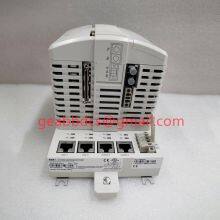. Electromagnetic interference
The industry characteristics of DCS application field determine that most DCS systems are located in harshelectromagnetic environments formed by strong electrical equipment. It is often impractical to eliminate interference sources and improve the anti-interference ability of DCS systems in applications.
5. Poor grounding
Poor grounding can easily lead to signal jumping and drift in DCS under electromagnetic interference, and in severe cases, it may cause damage to the board.
6. Temperature and humidity impact
High temperature, low temperature, dry, and humid working environments can all have a huge impact on the system, and DCS components are prone to failure or performance degradation due to the impact of these environments. Experiments have shown that for analog quantity cards, for every 10 ℃ temperature change, the accuracy will decrease by 0.1%; If the relative humidity exceeds 65%, a water film will form on the surface of the object, causing insulation degradation and accelerating corrosion; If the relative humidity is too low, synthetic materials are prone to brittleness, shrinkage, surface cracking, and damage.
7. Electrostatic effects
The surface of insulation materials is prone to accumulation of static electricity: Due to the current use of large-scale integrated circuits in boards and cards, the chip's voltage resistance is weak, so electrostatic discharge may cause board and chip failures. And this kind of damage has a certain degree of concealment and latency, which is easily overlooked.
Contact information: 15359293870
WhatsApp:+86 15359293870
Contact person: KELLY
Email: geabbdcs@gmail.com 386353502@qq.com
Official website:
2. Information security
The field of industrial control is no longer a safe haven, let's take a look at the safety risks of industrial control
3. Power failure
During the operation of automated instruments, if a system power failure occurs, it will pose a fatal threat to the DCS system. Poor plug contact, inability to automatically switch on backup power, insufficient circuit breaker capacity, mismatched load on automation instrument lines, power supply line accidents, and circuit component damage can all lead to system power supply failures. Common impacts include power interruption, voltage sag, overvoltage, undervoltage, etc. If the voltage is too high, it is easy to burn out the board, while if the voltage is insufficient, it can easily cause the board to not work properly, resulting in board fault light alarms, abnormal signal output, and other phenomena. Power interruption directly leads to the paralysis of the DCS system.

Send Inquiry to This Supplier
You May Also Like
-
GFD233A Interface ModuleNegotiableMOQ: 1 Bag
-
CS513Communication Module AutomationNegotiableMOQ: 1 Bag
-
CI858 Programmable ControllerNegotiableMOQ: 1 Bag
-
PP835A PanelNegotiableMOQ: 1 Bag
-
SNAT 7261 PCP Robot AccessoriesNegotiableMOQ: 1 Bag
-
UFC760 Control Board ModuleNegotiableMOQ: 1 Bag
-
CI854A Interface BoardNegotiableMOQ: 1 Bag
-
REX521GHHPSH06G Measuring and Control DeviceNegotiableMOQ: 1 Bag
-
DSSR122 48990001-NK Processing BoardNegotiableMOQ: 1 Bag
-
NRAI01 Processing BoardNegotiableMOQ: 1 Bag











